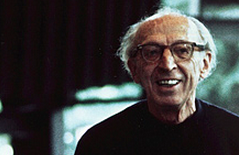Through art, we express the passion and freedom of the mind and soul. As a young child, I took the passionate idea to heart, banging on any piano keys I could find, calling my mom to stop the car when a particularly exquisite Palestrina Mass came on, and jumping up to conduct Beethoven’s Pastoral when I was three. For me, music spoke a language so beautiful I couldn’t help but respond. Those who have the ability to capture an essence in a brush of color, a dissonant chord, or a verse of poetry and who can sculpt that essence into something that is exquisite, are beloved. They are called Artists. One such Artist is the man, Aaron Copland. With the same passion as I, but with a specific spirit to express, Copland wrote the pieces that would, in his lifetime, label him the “father of the American sound.” The spirit he expressed was the heart of America.
To listen to Copland’s music is to peer through a kaleidoscope into America. He took tunes from the many different traditions and cultures within our nation and found a way to harmonize their dissonances to create a unifying message. Aaron Copland became famous just after the Post War years, when Americans were searching for a way to see themselves as a nation. As a young artist, Copland was already incorporating bits of Jazz, Latin, and even Klezmer music into his own works. All he had to do was to tie these tunes together to express America. Copland did not capture, but unleashed the wild rhythms of the West with his driving rhythms, and he returned time and time again to the simple and traditional Shaker melodies. In the process, he found the simple dignity and wild exuberance that was America. Above all, his music is honest at the core. It is this honesty that flows through the ears and into the hearts of all Americans who listen to Copland’s works. His universal strokes express a harmonized America.
I have not yet seen the America that is envisioned in Copland’s music. The America I hear today is far from harmonized. Even Copland did not experience the America he envisioned in his masterpieces. He was, in fact, blacklisted during the McCarthy era.
Perhaps he wrote so deeply about his country because he understood its flaws. In the open chords and the wistful melodies, there is an unmistakable undertone and longing to be free.
Through his art, Copland reminds us that we live in a great land; one that is breathtakingly vast and that is infused to the very roots with unbridled freedom. The music dances through time, for within the deep tones lies the soul of America. This is a land of dissonances, of harmonies, and of resolutions. It is this promise of resolution that makes his music universal. The music dances through America. And it dances through me.
This essay won the second annual Norman E. Alexander Award for Excellence in Jewish Student Writing, part of Jewish American Heritage Month.












